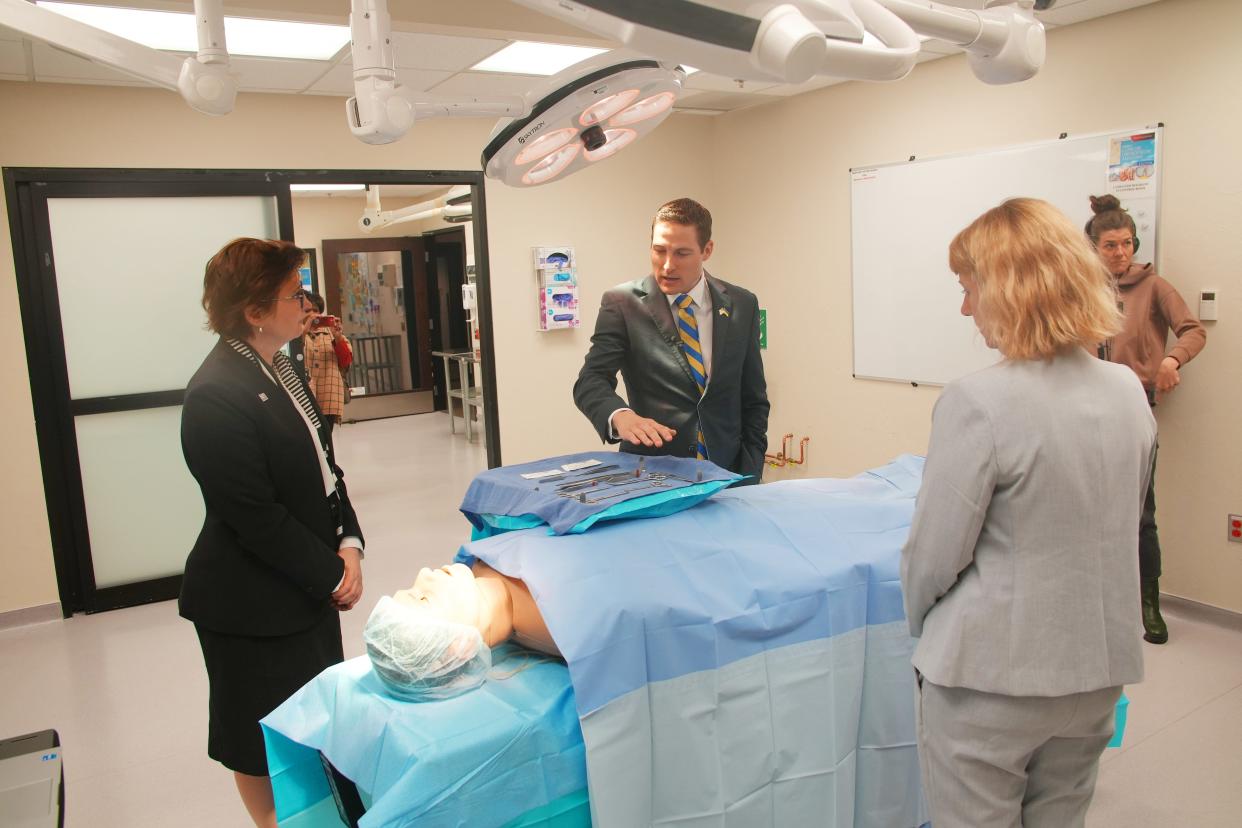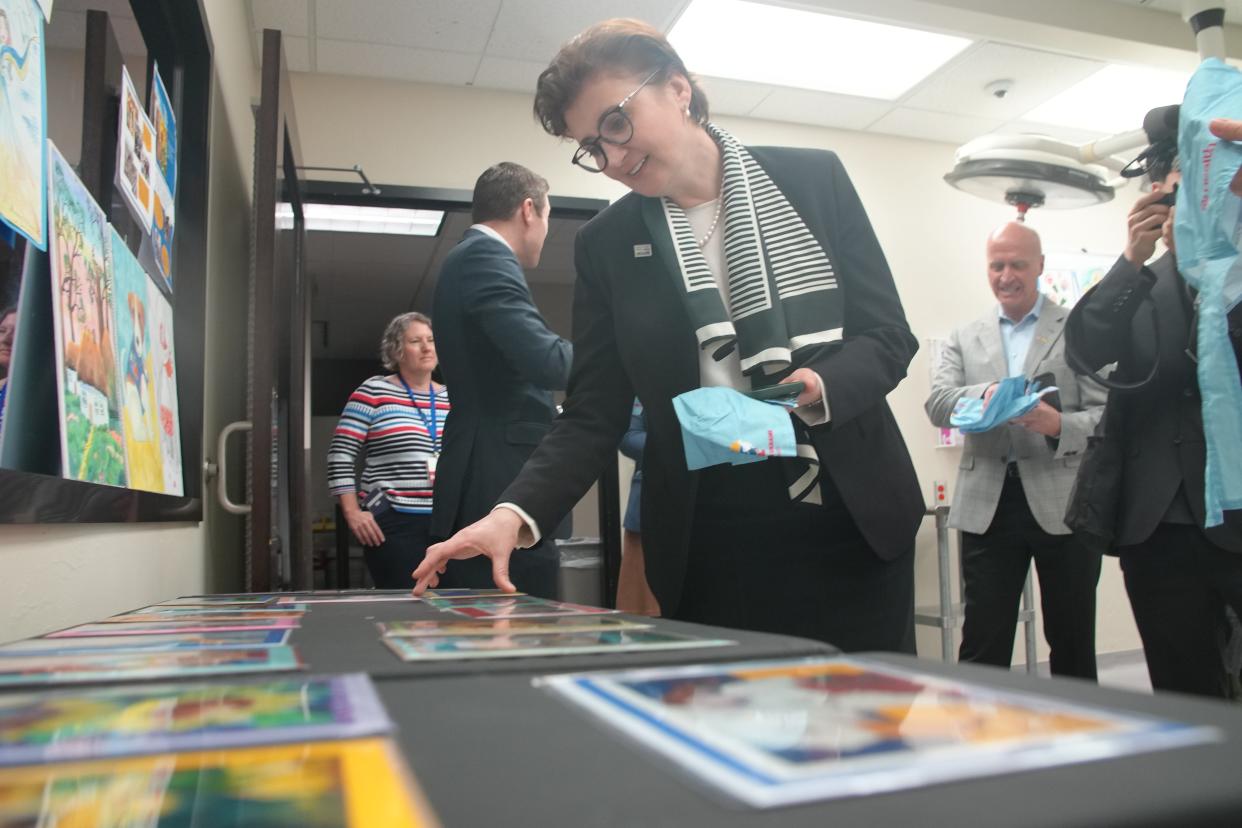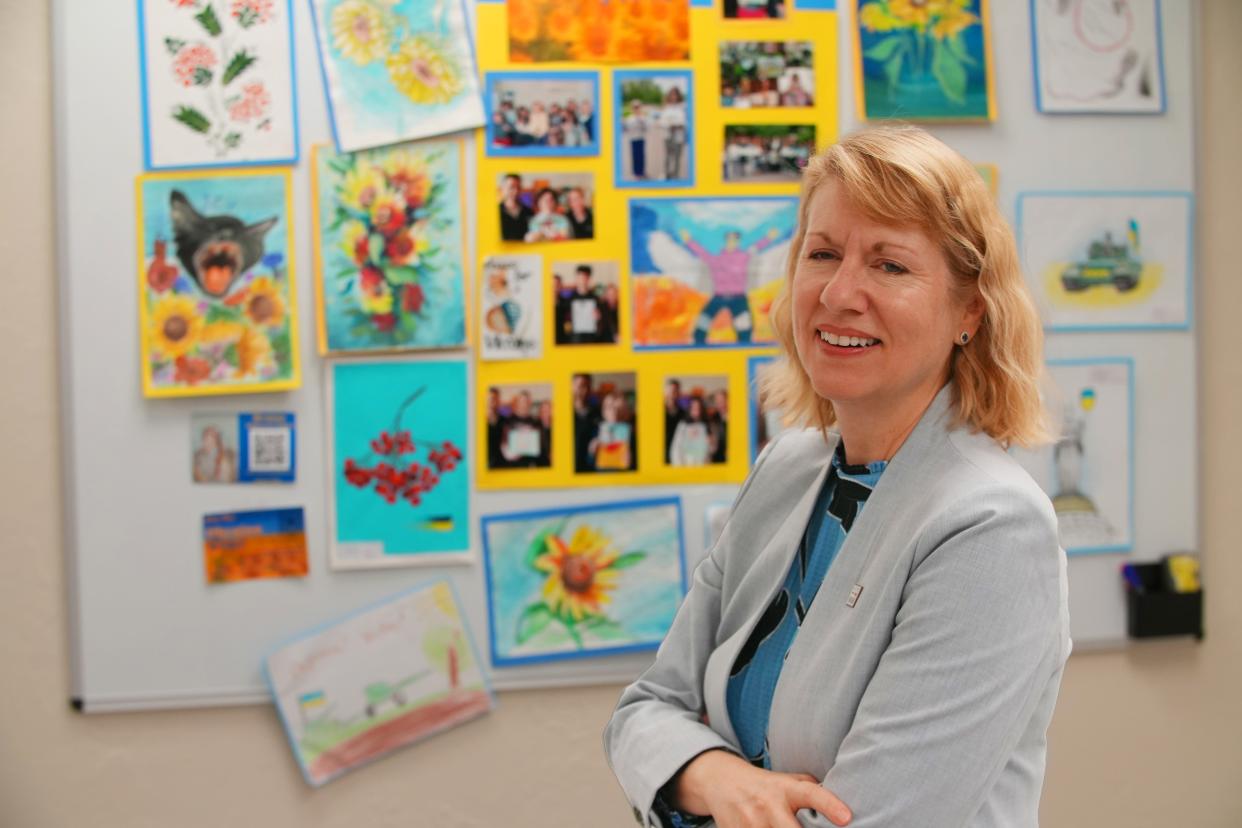How Oklahoma's medical community has been helping Ukrainian surgeons during the war

When Ukrainian surgeons needed specialized training to aid soldiers wounded during the war with Russia, an Oklahoma medical community volunteered to help.
Tuesday, University of Oklahoma Health representatives welcomed a Ukrainian diplomat and leaders with a nonprofit think tank and grant making organization to discuss how the medical community is bringing Ukrainian surgeons to Oklahoma City for an intensive training program called Operation Ukraine.
The OU Health visit was part of "Whistlestops for Ukraine," a public diplomacy initiative designed to support Ukraine's victory recovery and reconstruction. The multi-state tour was led by the German Marshall Fund of the U.S. and the Howard G. Buffett Foundation. German Marshall Fund leaders said Whistlestops for Ukraine was inspired by President Harry Truman's "whistlestop" tour in 1948, which he conducted to pitch the Marshall Plan to Americans. The Marshall Plan, named after Secretary of State George Marshall, wasa U.S. program that provided aid to Western Europe after World War II to help rebuild and stabilize the region.
More: Bake sale for body armor: Local Ukrainian church keeps faith, raises funds for Ukrainians
Kateryna Smagliy, first secretary for public and culture diplomacy at the Ukrainian Embassy in the U.S.; Heather A. Conley, German Marshall Fund president and Howard Buffett visited Oklahoma on a mission to speak to community leaders about why the outcome of the war in Ukraine matters to Oklahomans and how the conflict affects local, national and global communities.
How Oklahoma City became a place to train Ukrainian surgeons
Mark Mims, OU Health facial plastic and reconstructive surgeon and assistant professor in the department of otolaryngology-head and neck surgery at the OU College of Medicine, took the group on a brief tour of the Clinical Skills Education and Testing Center lab on the University of Oklahoma Health Sciences campus, and gave them an overview of Operation Ukraine and the way it helped a unique connection form between Oklahoma and Ukrainian surgeons.

He said the American Academy of Facial Plastic and Reconstructive Surgery had been conducting one-week mission trips to Ukraine, but they quickly found that the need was much greater. Mims said in addition, the ability to train a surgeon in one week on the techniques they needed was not feasible, so the academy looked for a group in the U.S. that would be willing to set up a program to bring Ukrainian surgeons to America to train them.
"At our national meeting in September of 2022, they reached out and said, if anybody was interested in creating such a program, they would welcome it," Mims said. "This was in a hall of 250 to 300 surgeons from all over the country and we were the only ones to volunteer. So they said if we wanted to attempt to create such a program, that we could go for it, and I've been running with it ever since."
The surgeon said the main focus for OU health surgeons has been training their Ukrainian counterparts in a particular type of reconstructive surgery called microvascular or free tissue transfer. He said what that basically means is that surgeons take one part of the body and transfer it to another part to recreate a different part. He said the surgeons sew tiny blood vessels together using sutures that are thinner than a human strand of hair. Surgeons are required to use precise movements and have access to certain tools to perform such procedures.
'This is the American spirit'
Mims said in addition to OU Health surgeons, others in the OU Health community have embraced the visiting Ukrainian soldiers. These included Michael A. McGrail, OU College of Medicine simulation specialist, and his wife Jennifer, who said they have enjoyed hosting many of the visiting Ukrainian surgeons in their home. Mims said the Ukrainian community in Oklahoma has also helped to make the visiting medical professionals feel comfortable while in the state for training.
More: How painting sunflowers are helping Oklahomans raise funds for Ukraine
The surgeon said he has been amazed by the kindness and resiliency of the surgeons that have come for training in Oklahoma.
"It has been a real honor for us to be able to show the work that we have been doing because we are very passionate about it," he said. "We feel like we have been a very small part of supporting the Ukrainian community and that really, we have received more from them than they receive from us."
Conley, leader of the German Marshall Fund, said what struck her the most in the first two stops of the Whistlestop Oklahoma visit was that attributes like compassion unites people.
"There were so many powerful messages in what you've just shown us," she told Mims during his presentation. "I'm awfully glad you stood up and said 'yes.' This is the American spirit."
In addition to the tour and discussion with Operation Ukraine surgeons at OU Health, the Whistlestops for Ukraine contingent also attended a prayer service and time of fellowship at St. Mary's Dormition Ukrainian Orthodox Church. The group also took part in a roundtable discussion with members of the Oklahoma agriculture community, met with Oklahoma City Mayor David Holt and some of his law students at Oklahoma City University, and traveled to the Capitol to talk with several elected leaders.
At St. Mary's, the church's Ukrainian priest, the Rev. Stepan Bilogan, welcomed the visitors in his native language. A translator interpreted his words into English as the spiritual leader said one of the first places a Ukrainian looks for in the United States is a church with Ukrainian Orthodox connections because it reminds them of home.
Ukrainian diplomat Smagliy said the Oklahomans she had met thus far, like people in other U.S. cities she has visited, were gracious and welcoming.

"In every city, no matter how big or small, you see people so, so generous, so friendly, so kind, so supportive," Smagliy said.
"Every gesture of solidarity, it touches us immensely. And people back home in Ukraine, know when they learn about this story, when they see the faces of Americans who started this (Operation Ukraine) initiative, they feel they're not alone. It gives them strength."
This article originally appeared on Oklahoman: Diplomat visits Oklahoma with focus on Ukrainian connections
